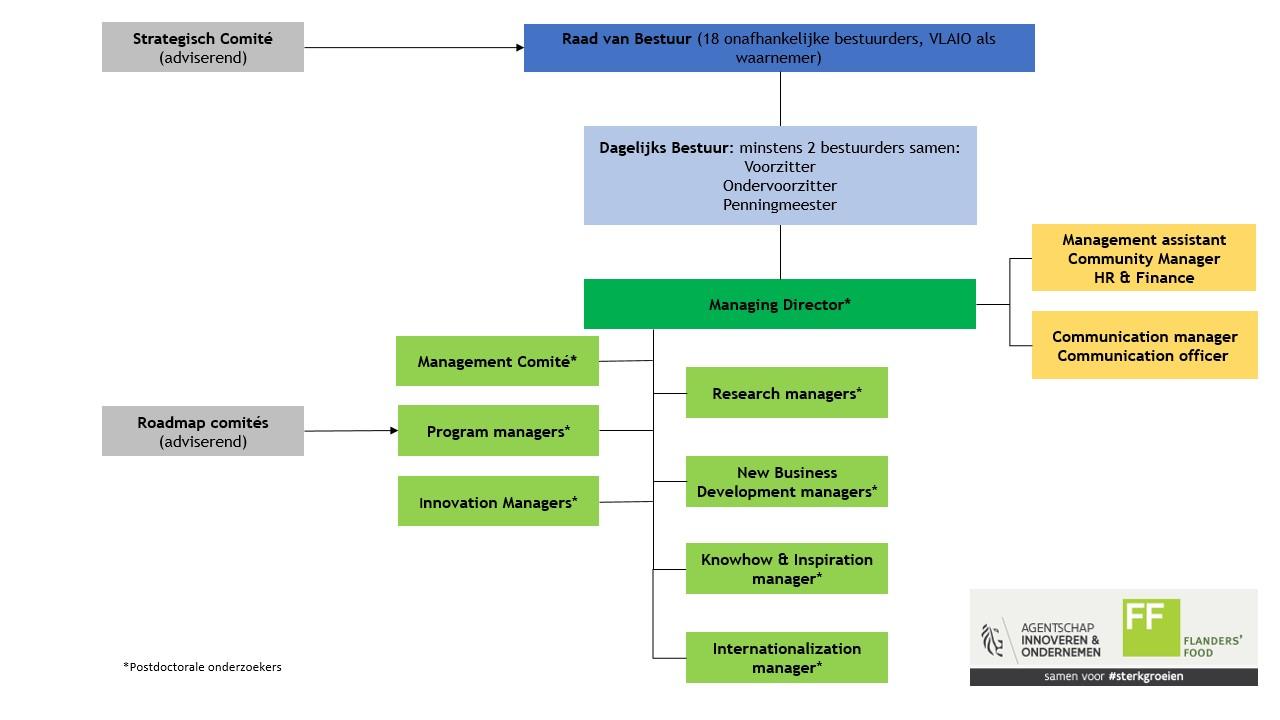Operation
Governance: Administrative bodies
Flanders’ FOOD is a non-profit organisation managed by a board of directors with Jan Vander Stichele as chair. Flanders’ FOOD has both economic objectives and the objective of disseminating knowledge about the food industry based on independent research.
Board of directors
The board of directors consists of 18 board members and two observers and is driven by the industry. 16 board members are representatives from businesses from the Flemish food industry. The other two board members are representatives from Flemish universities. The board members are volunteers and receive no remuneration.
The board of directors meets three times per calendar year. The board of directors discusses all aspects of the organisation. They take decisions and/or submit to the General Meeting and/or delegate authorities to the managing director.
Daily management
The managing director organises the operation of Flanders’ FOOD cf. the delegates from the board of directors. The managing director has regular meetings (at least every 3 weeks) with the chair and the treasurer. The chair and vice-chair meet regularly. Decisions that have a large impact on the budget or operation are discussed with the chair in advance.
General meeting
All members of Flanders’ FOOD are represented in the General Meeting. The General Meeting is held at least once a year and is an open discussion with all legal representatives of the members (or their proxies). The General Meeting takes decisions on all aspects that entail a change in the statutes, appoints board members, determines the annual membership fee and approves the annual account.
Governance: Advisory bodies
Strategic committee
A strategic advice committee advises the board of directors. The strategic committee consists of the Flanders’ FOOD chair, Fevia Vlaanderen's secretary general, Boerenbond's chair, ILVO's general administrator, Ghent University's director of research, VUB's director of valorisation and KU Leuven's Research & Development's delegated director. This committee has no decision-making authority and meets approximately twice a year to discuss the spearhead cluster's strategic options in the area of research and innovation. The focus is mainly on the spearhead cluster's long-term research activities.
Roadmap committee
The governance of the strategic research and innovation programs occurs at a roadmap level via a roadmap committee.
This committee consists of a team of people from agri-food companies (Captains of Food Industry), from social actors (Captains of Society) and knowledge institutes (Lead Scientists) and supported by a program manager from Flanders’ FOOD. Team members from the business world and society provide knowledge about technological expertise, insights into marketing and economic relevance for the companies. Team members from the knowledge institutes provide scientific expertise. A program manager, together with this external team, carries out tasks that are necessary in deciding whether to support the start of a project and generate the project start. The various team members participate as individuals, they are neutral, offer help in the form of advice and expertise and manage the entire flow/process of the roadmaps. This roadmap committee has no decision-making authority, but advises Flanders’ FOOD about the need to update the roadmap and/or organise specific actions to start up successful projects.
Members
Flanders’ FOOD has members from food companies and businesses from related sectors as well as partners and knowledge institutes. Below you will find graphs of the members per sector, the number of SMEs, large businesses, knowledge institutes, partners and an overview of members per region.
Organigram
